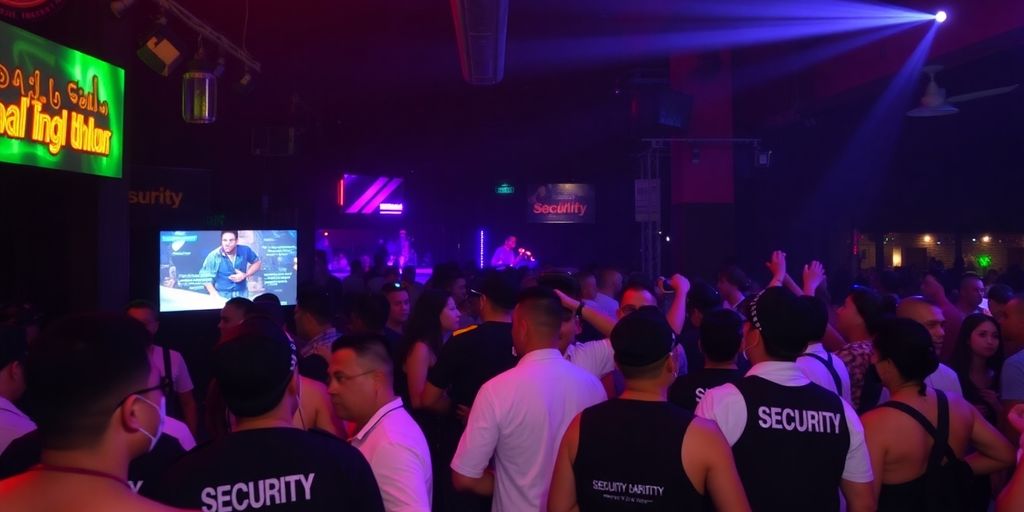Bali’s nightlife is vibrant and attracts tourists from all over the world. However, with the fun and excitement, there are also safety concerns that come with crowded nightclubs. Bali nightclub security plays a vital role in ensuring that visitors have a safe experience while enjoying the nightlife. From managing crowds to responding to emergencies, security personnel are essential in preventing violence and crime, making Bali a safer place for everyone.
Key Takeaways
- Bali nightclub security includes various types of trained personnel.
- Effective crowd management helps prevent dangerous situations.
- Security teams collaborate with local authorities to address incidents of violence.
- Tourists should be aware of personal safety tips and emergency contacts.
- Technology, like surveillance and access control, enhances nightclub security.
Understanding Bali Nightclub Security Measures

Nightclub security in Bali is a complex issue, balancing the need to provide a safe environment for tourists and locals alike with the realities of managing large crowds and potential for alcohol-fueled incidents. It’s not just about bouncers at the door; it’s a whole system of measures designed to prevent problems before they start and respond effectively when they do.
Types of Security Personnel
When you walk into a Bali nightclub, you’re likely to encounter several types of security personnel, each with specific roles. There are the obvious ones, like the door security checking IDs and doing pat-downs. But there are also plainclothes officers who blend into the crowd, monitoring for suspicious behavior. Then you have the CCTV operators watching the cameras, and the security managers overseeing the whole operation. It’s a layered approach, designed to catch anything that might slip through the cracks.
- Bouncers: Responsible for entry control and maintaining order at the door.
- Floor Security: Patrol the club, looking for potential problems.
- CCTV Operators: Monitor surveillance cameras.
Training and Certification
It’s easy to assume that anyone can be a security guard, but in Bali, there are (or at least, should be) standards for training and certification. Security personnel need to be trained in conflict resolution, first aid, and emergency procedures. They also need to understand local laws and regulations regarding alcohol service and acceptable behavior. The quality of training can vary, but the best clubs invest in comprehensive programs to ensure their staff are prepared for anything.
A well-trained security team is the first line of defense against violence and crime. They need to be able to spot potential problems, de-escalate conflicts, and respond quickly and effectively to emergencies.
Emergency Response Protocols
What happens when something goes wrong? That’s where emergency response protocols come in. Every nightclub should have a plan in place for dealing with various scenarios, from fights and medical emergencies to fires and natural disasters. This includes evacuation procedures, communication protocols, and coordination with local authorities. The effectiveness of these protocols depends on how well they’re planned, practiced, and communicated to staff. It’s not enough to have a plan on paper; it needs to be a living document that’s regularly reviewed and updated. Having clear emergency protocols is key.
- Evacuation Plans: Clearly marked exits and trained staff to guide patrons.
- First Aid: On-site medical personnel or trained staff with first aid kits.
- Communication Systems: Radios or other devices for quick communication between security personnel.
The Importance of Crowd Management
Crowd management is more than just keeping people moving; it’s about ensuring their safety and well-being. In a nightclub setting, where alcohol, loud music, and confined spaces are the norm, effective crowd control is absolutely necessary. It’s about preventing situations from escalating and creating a secure environment for everyone.
Preventing Overcrowding
Overcrowding is a recipe for disaster. It increases the risk of accidents, fights, and even stampedes. Nightclubs need to have strict capacity limits and systems in place to monitor the number of people inside. This might involve using clicker counters at the entrance, implementing a one-in-one-out policy when capacity is reached, or using more sophisticated technology like people-counting sensors. It’s also important to consider the layout of the club and ensure there are clear pathways for people to move around. Think about it – nobody wants to be stuck in a sweaty, claustrophobic mess, and that’s exactly what overcrowding leads to. Here are some ways to prevent it:
- Implement strict capacity limits.
- Use technology to monitor occupancy.
- Train staff to recognize and respond to overcrowding.
Monitoring Guest Behavior
Security staff need to be vigilant in observing guest behavior. This means looking out for signs of intoxication, aggression, or any other behavior that could pose a risk to others. Early intervention is key. If someone is getting too rowdy, security should step in and address the situation before it escalates. This might involve a simple warning, or, if necessary, removing the person from the premises. It’s a delicate balance between ensuring people are having a good time and maintaining a safe environment. It’s also important to have a clear policy on acceptable behavior and to communicate this policy to guests. This can be done through signage, verbal announcements, or even a brief explanation at the entrance. crowd management is a key aspect of this.
Managing Entry and Exit Points
The way people enter and exit a nightclub can have a big impact on crowd flow and safety. Entry points should be well-organized, with clear lines and adequate security screening. Exit points should be easily accessible and clearly marked, especially in case of an emergency. It’s also important to have staff stationed at entry and exit points to manage the flow of people and provide assistance if needed. Consider using barriers or ropes to create designated lanes and prevent bottlenecks. And don’t forget about accessibility – ensure that entry and exit points are accessible to people with disabilities. Here are some things to consider:
- Designated entry and exit lanes.
- Adequate lighting and signage.
- Staff stationed at key points.
Effective crowd management isn’t just about preventing problems; it’s about creating a positive and enjoyable experience for everyone. When people feel safe and comfortable, they’re more likely to have a good time and return in the future. It’s an investment in the club’s reputation and long-term success.
Addressing Violence and Crime in Nightclubs
Nightclubs, while offering entertainment, can unfortunately be hotspots for violence and criminal activity. It’s important to understand the types of incidents that can occur, how they’re handled, and the cooperation needed with local authorities to maintain a safe environment.
Types of Violent Incidents
Nightclub violence can range from minor altercations to serious assaults. Common incidents include:
- Fights breaking out due to intoxication or disagreements.
- Theft, such as pickpocketing or stolen drinks.
- Assault, ranging from pushing and shoving to physical attacks.
- Sexual harassment or assault.
- Use of weapons, though less common, is a serious concern.
Understanding the common types of incidents helps security staff prepare and respond effectively. It’s not just about physical altercations; petty crime is also a big issue. Tourists in Bali are receiving new safety advice following a rise in robberies, so it’s important to be aware of your surroundings.
Reporting and Documentation
Proper reporting and documentation are vital after any incident. This includes:
- Detailed incident reports, including date, time, location, and individuals involved.
- Statements from witnesses and victims.
- Photographic or video evidence, if available.
- Medical reports for any injuries sustained.
Accurate records are essential for legal purposes and for identifying patterns or problem areas within the venue. This information can then be used to improve security measures and prevent future incidents.
Collaboration with Local Authorities
Nightclubs need to work closely with local police and other authorities. This collaboration involves:
- Regular communication and information sharing.
- Reporting serious crimes immediately.
- Participating in community safety initiatives.
- Cooperating with investigations.
Working with the police helps ensure that any criminal activity is dealt with appropriately. It also sends a message that the nightclub is committed to safety and security. This collaboration is key to promoting safe nightlife practices. It’s also important to remember that standards of police services differ considerably, so violent crime should be reported immediately.
Safety Protocols for Tourists
Personal Safety Tips
Okay, so you’re heading out for a night in Bali. Awesome! But let’s talk safety for a sec. It’s all about being smart and aware. First off, stick with your friends. There’s safety in numbers, right? Don’t wander off alone, especially if you’ve had a few drinks. Keep an eye on your drinks too – never leave them unattended. It’s just not worth the risk. Also, be mindful of your belongings. Keep your wallet and phone secure, and avoid flashing expensive jewelry or electronics. You don’t want to make yourself a target.
- Stay aware of your surroundings.
- Avoid walking alone at night.
- Use reputable transportation services.
It’s easy to get caught up in the fun, but remember that petty theft can happen. Keep your valuables out of sight and be cautious in crowded areas. A little bit of prevention goes a long way.
Recognizing Warning Signs
Sometimes, things just don’t feel right. Trust your gut! If a situation seems sketchy, it probably is. Be aware of aggressive behavior, excessive intoxication, or people trying to pressure you into something you don’t want to do. If you spot any of these warning signs, remove yourself from the situation immediately. Find a security guard, a bartender, or a friend and let them know what’s going on. Don’t be afraid to speak up and ask for help. It’s better to be safe than sorry. Also, be wary of strangers offering you drinks or drugs. Just say no and walk away.
Emergency Contact Information
Before you even head out, make sure you have important contact information saved in your phone. This includes the local police Bali police station, your embassy or consulate, and the phone number of a trusted friend or family member back home. It’s also a good idea to know the address of your hotel or accommodation in case you need to give it to someone in an emergency. In case of a medical emergency, familiarize yourself with the location of the nearest hospital or clinic. And finally, make sure you have travel insurance that covers medical expenses and other emergencies. It’s a small price to pay for peace of mind.
Here’s a quick reference table:
| Emergency Type | Contact Information |
|---|---|
| Police | (Insert Local Police Number Here) |
| Ambulance | (Insert Local Ambulance Number Here) |
| Fire Department | (Insert Local Fire Department Number Here) |
| Your Embassy/Consulate | (Insert Your Embassy/Consulate Number and Address Here) |
The Role of Technology in Nightclub Security

Nightclubs in Bali are increasingly using technology to improve safety and security for tourists. It’s not just about having cameras anymore; it’s about integrating different systems to create a safer environment. Let’s look at some of the key areas where tech is making a difference.
Surveillance Systems
Surveillance systems are now more advanced than ever. High-definition cameras with facial recognition capabilities are becoming common. These systems can help identify known troublemakers or individuals who have been previously banned from the establishment. They also provide valuable evidence in the event of an incident. Strategic surveillance technology is a must.
- Real-time monitoring of all areas of the club.
- Recording and storage of footage for later review.
- Integration with other security systems for a comprehensive approach.
Access Control Technologies
Access control is another area where technology is playing a big role. Gone are the days of simple ID checks. Now, many clubs are using sophisticated systems to verify age and identity. This helps prevent underage drinking and ensures that only authorized individuals enter the premises.
- Biometric scanners for staff access.
- ID scanners to verify age and detect fake IDs.
- Metal detectors to prevent weapons from entering the club.
Incident Reporting Software
Incident reporting software is streamlining the way security personnel document and manage incidents. Instead of relying on paper forms, staff can now use mobile apps to quickly report issues, upload photos, and track the progress of investigations. This leads to faster response times and better record-keeping.
Using incident reporting software allows for better communication between security staff and management. It also provides valuable data for identifying trends and patterns, which can be used to improve security protocols.
- Real-time incident reporting from mobile devices.
- Centralized database for tracking all incidents.
- Automated alerts and notifications for critical events.
Training and Development for Security Staff
Nightclub security isn’t just about having a big presence; it’s about being prepared, knowledgeable, and capable of handling a wide range of situations. That’s why ongoing training and development are so important for security staff. It’s an investment in safety and a way to make sure everyone has a good time without incident. Let’s get into the specifics.
Ongoing Education Programs
It’s not enough to just train security staff once and consider them ready for anything. The world changes, and so do the challenges they face. Ongoing education programs are key to keeping their skills sharp and their knowledge up-to-date. These programs can cover a variety of topics, including:
- De-escalation techniques: Learning how to calm tense situations before they turn violent.
- First aid and CPR: Being able to respond quickly and effectively in medical emergencies.
- Legal updates: Staying informed about the latest laws and regulations related to security and safety.
- Cultural sensitivity: Understanding and respecting the diverse backgrounds of patrons.
Regular refresher courses and workshops help security personnel stay on top of their game. It’s about continuous improvement and making sure they’re always prepared for whatever comes their way.
Scenario-Based Training
Theory is important, but nothing beats practical experience. Scenario-based training puts security staff in simulated real-world situations, allowing them to practice their skills in a safe and controlled environment. This type of training can include:
- Simulated altercations: Practicing how to safely break up fights and restrain aggressive individuals.
- Emergency evacuations: Learning how to quickly and efficiently evacuate the nightclub in case of a fire or other emergency.
- Dealing with intoxicated patrons: Developing strategies for managing people who have had too much to drink.
This hands-on approach helps security staff build confidence and develop the quick-thinking skills they need to handle challenging situations. It’s about learning by doing and preparing for the unexpected.
Crisis Management Techniques
Sometimes, things go wrong despite everyone’s best efforts. That’s where crisis management techniques come in. Security staff need to be trained on how to respond effectively in a crisis situation, such as a major fight, a medical emergency, or even a terrorist threat. This training should cover:
- Communication protocols: Knowing how to communicate effectively with other staff members, emergency services, and patrons.
- Crowd control strategies: Learning how to manage large crowds and prevent panic.
- Risk assessment: Being able to quickly assess the level of risk and take appropriate action.
| Crisis Scenario | Immediate Actions | Follow-Up Actions |
|---|---|---|
| Large Fight | Separate combatants, call for backup | Review security footage, file incident report |
| Medical Emergency | Administer first aid, call emergency services | Contact victim’s family, review emergency protocols |
| Suspicious Package | Evacuate area, notify authorities | Conduct thorough search, increase security measures |
Proper beach club compliance is key to ensuring the safety of everyone involved. It’s about having a plan in place and knowing how to execute it effectively. By investing in ongoing education, scenario-based training, and crisis management techniques, Bali nightclubs can ensure that their security staff are well-prepared to protect tourists and create a safe and enjoyable environment for everyone.
Community Engagement and Awareness
Building Trust with Locals
It’s super important for nightclubs to have a good relationship with the local community. This means more than just being polite; it’s about active involvement. One way to do this is by participating in local events or sponsoring community initiatives. This shows that the nightclub cares about the area and isn’t just there to make money. Another thing is to hire local staff. This not only provides jobs but also creates a sense of connection between the club and the community. Regular meetings with community leaders can also help address any concerns and build mutual understanding.
Promoting Safe Nightlife Practices
Nightclubs can play a big role in promoting safe nightlife. This isn’t just about security inside the club; it’s about educating patrons and the wider community. Here are some ways to do that:
- Running campaigns on responsible drinking.
- Providing information on safe transportation options.
- Working with local organizations to raise awareness about issues like sexual assault and drug use.
By taking a proactive approach to safety, nightclubs can help create a more positive and secure environment for everyone.
Collaborating with Tourism Boards
Tourism boards are key players in promoting Bali as a safe and enjoyable destination. Nightclubs can work with these boards to travel and tourism share information and coordinate efforts. This could involve:
- Participating in joint marketing campaigns that highlight safety measures.
- Sharing data on incidents to help identify trends and address potential problems.
- Working together to develop and implement safety standards for the nightlife industry.
Here’s a simple table showing how collaboration can improve safety:
| Collaboration Area | Benefit |
|---|---|
| Data Sharing | Early identification of safety issues |
| Joint Campaigns | Increased awareness among tourists |
| Standard Setting | Consistent safety practices across venues |
Final Thoughts on Nightclub Safety in Bali
In the end, staying safe while enjoying Bali’s nightlife is all about being aware and prepared. The security teams at nightclubs play a big part in keeping things under control and making sure everyone has a good time without worrying about violence or trouble. Tourists should always keep their eyes open, stick with friends, and trust their instincts. If something feels off, it’s best to leave the area. Remember, a little caution goes a long way in ensuring a fun and safe night out in Bali.
Frequently Asked Questions
What types of security are typically found in Bali nightclubs?
Bali nightclubs usually have various types of security, including bouncers, surveillance staff, and sometimes police officers to help keep everyone safe.
How are security personnel trained in Bali?
Security staff in Bali undergo training programs that teach them how to handle emergencies, manage crowds, and ensure safety in nightclubs.
What should tourists do if they witness violence in a nightclub?
If you see violence happening, it’s important to stay calm, move to a safe area, and report the incident to security or the police.
What safety tips can tourists follow while enjoying nightlife in Bali?
Tourists should keep their belongings close, avoid accepting drinks from strangers, and always be aware of their surroundings.
How does technology help in nightclub security?
Many nightclubs use cameras to monitor the area, electronic entry systems to control who comes in, and software to report any incidents.
What role do local communities play in nightclub safety?
Local communities help by building trust with security staff and promoting safe nightlife practices, which can make everyone feel more secure.







